|
Also see Jonathan's reviews of Holiday CDs
This holiday, three theater-related DVDs are guaranteed to be on
everyone's gift list (whether 'tis better to give or receive them is up to
you).
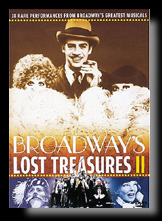 First up is the second entry in the Broadway's Lost
Treasures series, Broadway's Lost Treasures II, which once again compiles musical numbers featured
in Tony Award ceremonies throughout the years. And, once again, it only
whets one's appetite for what remains in the vaults. The clips, grouped in
categories such as Leads (with highlights being Patti LuPone performing
"Anything Goes" and Angela Lansbury lighting up the stage with Bea Arthur
in "Bosom Buddies"), All Singing, All Dancing (which preserves Brent
Barrett and Michael Jeter's breathtaking "We'll Take A Glass Together"
from Grand Hotel) and the catch-all Revivals and Record Breakers
(which gives viewers a chance to compare original performances from
Chicago and La Cage aux Folles with their currently running
counterpart revivals). First up is the second entry in the Broadway's Lost
Treasures series, Broadway's Lost Treasures II, which once again compiles musical numbers featured
in Tony Award ceremonies throughout the years. And, once again, it only
whets one's appetite for what remains in the vaults. The clips, grouped in
categories such as Leads (with highlights being Patti LuPone performing
"Anything Goes" and Angela Lansbury lighting up the stage with Bea Arthur
in "Bosom Buddies"), All Singing, All Dancing (which preserves Brent
Barrett and Michael Jeter's breathtaking "We'll Take A Glass Together"
from Grand Hotel) and the catch-all Revivals and Record Breakers
(which gives viewers a chance to compare original performances from
Chicago and La Cage aux Folles with their currently running
counterpart revivals).
While the majority of the eighteen clips were seen
on a PBS telecast, the five bonus clips make owning this DVD far superior
to any TIVO or VHS-ed copy one may already have. Indeed, the highlight of
the entire disc is a clip from Coco (featuring
Katharine Hepburn) that is nearly fifteen minutes long, making it the longest clip in Tony telecast
history, per host Lauren Bacall (who managed to eradicate any trace of
smugness she may have felt over the fact that she beat Hepburn for the
Best Actress In A Musical Tony in 1970).
 PBS also broadcast the almost six-hour-long mini-series,
Broadway: The American Musical, recently released on a 3 DVD set.
The six-part mini-series breaks down the history of the Broadway musical
from its roots at the turn of the 20th century to its hits from last
season. While it has its flaws, from not being overly comprehensive (six
hours could be spent covering the Golden Age of the '50s and '60s alone) to
the woeful lack of documentation with its clips, to its presentation of
'facts' that are questionable in nature (largely due to its reliance on
interviews that give the interviewee's opinion and memory of events an
aura of accuracy not always deserved), the series serves as a wonderful
introduction for newcomers to the genre who can use the show as a jumping
off point for further research. PBS also broadcast the almost six-hour-long mini-series,
Broadway: The American Musical, recently released on a 3 DVD set.
The six-part mini-series breaks down the history of the Broadway musical
from its roots at the turn of the 20th century to its hits from last
season. While it has its flaws, from not being overly comprehensive (six
hours could be spent covering the Golden Age of the '50s and '60s alone) to
the woeful lack of documentation with its clips, to its presentation of
'facts' that are questionable in nature (largely due to its reliance on
interviews that give the interviewee's opinion and memory of events an
aura of accuracy not always deserved), the series serves as a wonderful
introduction for newcomers to the genre who can use the show as a jumping
off point for further research.
It is actually one of the few DVD sets where the extras outweigh the
feature itself. Each disc is a gold mine of additional performances and
interviews, which, when combined, almost double the length of the series.
Bonus performance highlights include early vaudeville films from the Library of
Congress Variety Stage collection, Eddie Cantor's tailor shop routine in
the 1929 feature film Glorifying the American Girl that gives a rare
look at his comic stylings (which remain remarkably fresh after nearly
eight decades), "Hostesses of the Stage Door Canteen" (a number from
Irving Berlin's wartime revue This Is the Army that rivals anything
seen in La Cage), a nearly 12-minute television performance of "If
I Loved You" from Carousel performed by John Raitt and Jan Clayton
that illustrates why it remains one of the best written scenes in musical
theater, an interview with Stephen Sondheim and the original cast of
Pacific Overtures that includes a performance of "Someone in a
Tree," and a clip featuring Jonathan Larson performing his Sondheim
homage, "Sunday." (The amount of time devoted to Wicked, which
includes rehearsal footage of "For Good" and a featurette on its road to
Broadway, is a bit of an overkill, making one think that the producers
jumped the gun in thinking Wicked would win the Tony last year,
especially given the lack of coverage given to 2004's actual winner of the
Best Musical Tony, Avenue Q)
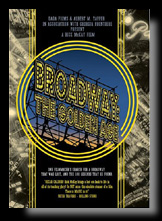 The 'must-have' DVD of the season, however is Broadway: The Golden
Age
, Rick McKay's archival labor of love that features interviews with
100 Broadway performers. While calling them "the greatest stars ever to
work on Broadway or in Hollywood" is admittedly overstating things, since
most of the true Broadway legends had sadly passed on by the time McKay
started work on the film, McKay is to be commended for committing at least
a portion of Broadway's collective memory to film. While some have decried
its lack of narrative structure, the fact that McKay was content to simply
allow an oral history be created, rather than impose an overarching
'theme' on his subjects, is its greatest achievement, for in letting the
subjects simply reminisce, astonishing throughlines emerged. Whether it be
shared remembrances of hanging out at Gray's Drugstore, the joys of
'second acting,' or recalling theater's legendary stories, (such as
Brando's explosion on the scene in A Streetcar Named Desire,
Shirley MacLaine's rise from understudy to overnight stardom in The
Pajama Game, and the one actress who seemed to influence everyone
interviewed in the film, Laurette Taylor (who was the original Amanda
Wingfield in Tennessee Williams's The Glass Menagerie and has been
largely forgotten), a great sense of community arises throughout the film.
Of course, there is archival footage galore featuring rehearsals and
performances of classic shows like Camelot, Bus Stop, Cat on a Hot Tin
Roof, A Streetcar Named Desire, West Side Story, and Damn
Yankees that add to the pleasure. The 'must-have' DVD of the season, however is Broadway: The Golden
Age
, Rick McKay's archival labor of love that features interviews with
100 Broadway performers. While calling them "the greatest stars ever to
work on Broadway or in Hollywood" is admittedly overstating things, since
most of the true Broadway legends had sadly passed on by the time McKay
started work on the film, McKay is to be commended for committing at least
a portion of Broadway's collective memory to film. While some have decried
its lack of narrative structure, the fact that McKay was content to simply
allow an oral history be created, rather than impose an overarching
'theme' on his subjects, is its greatest achievement, for in letting the
subjects simply reminisce, astonishing throughlines emerged. Whether it be
shared remembrances of hanging out at Gray's Drugstore, the joys of
'second acting,' or recalling theater's legendary stories, (such as
Brando's explosion on the scene in A Streetcar Named Desire,
Shirley MacLaine's rise from understudy to overnight stardom in The
Pajama Game, and the one actress who seemed to influence everyone
interviewed in the film, Laurette Taylor (who was the original Amanda
Wingfield in Tennessee Williams's The Glass Menagerie and has been
largely forgotten), a great sense of community arises throughout the film.
Of course, there is archival footage galore featuring rehearsals and
performances of classic shows like Camelot, Bus Stop, Cat on a Hot Tin
Roof, A Streetcar Named Desire, West Side Story, and Damn
Yankees that add to the pleasure.
Once again, the extras add mightily to the overall whole and include
additional performance clips (including Bob Fosse and Gwen Verdon
performing "Whatever Lola Wants" from Damn Yankees), a
seventeen-minute alternate ending exploring the current state of Broadway,
and a thirty-five minute sneak peek of the upcoming sequel, Broadway:
The Next Generation, featuring interviews with 'newcomers' like Patti
LuPone.
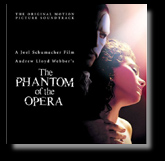 Listening to the Motion Picture Soundtrack of The Phantom of the Opera, I was struck by what lay behind the titular character's
motives: his goal is not to catapult a talented soprano with whom he is
smitten from the ranks of the chorus to the heights of fame she deserves.
Oh no, it is to completely eradicate legitimate singing from the stage, be
it on Broadway or at the opera. Or at least that is the impression this
reviewer received listening to the soundtrack. While the film by
Joel Schumacher may pack a visual punch (but as it doesn't open until
December 22nd, that awaits to be seen) and thus do the show justice on
some level, as an auditory experience the soundtrack is sorely lacking,
and is insulting on many levels. Given the pulse-quickening overture,
newly orchestrated by its original orchestrator David Cullen for a
beefed-up hundred-piece orchestra (yet retaining all the flavor of the
original arrangement), one expects the performances to soar to the top of
the Paris Opera House and swing from its iconic chandelier. Instead, one
gets watered down, wispy, off-key performances that are lacking in vocal
presence, character or tone. Listening to the Motion Picture Soundtrack of The Phantom of the Opera, I was struck by what lay behind the titular character's
motives: his goal is not to catapult a talented soprano with whom he is
smitten from the ranks of the chorus to the heights of fame she deserves.
Oh no, it is to completely eradicate legitimate singing from the stage, be
it on Broadway or at the opera. Or at least that is the impression this
reviewer received listening to the soundtrack. While the film by
Joel Schumacher may pack a visual punch (but as it doesn't open until
December 22nd, that awaits to be seen) and thus do the show justice on
some level, as an auditory experience the soundtrack is sorely lacking,
and is insulting on many levels. Given the pulse-quickening overture,
newly orchestrated by its original orchestrator David Cullen for a
beefed-up hundred-piece orchestra (yet retaining all the flavor of the
original arrangement), one expects the performances to soar to the top of
the Paris Opera House and swing from its iconic chandelier. Instead, one
gets watered down, wispy, off-key performances that are lacking in vocal
presence, character or tone.
While Emily Rossum may be appropriate age-wise for Christine Daae,
the object of the phantom's obsession, her voice is so small that one can
hardly imagine it reaching the footlights, much less crossing them and
filling an opera house (or surviving one elimination round in American
Idol, for that matter). On moments in "Think of Me" and "Wishing You Were
Somehow Here Again" that require a singer to reach bravura heights, she is
overwhelmed by the orchestra and chokes on the emotions rather than
releasing them. As the Phantom, Gerard Butler gives the worst
rendition of "Music of the Night" (or any of other song, for that matter)
this reviewer has heard on the number's dozens of recordings. With all the
electronics capable of turning any pitchy (but busty) teenager into a pop
music sensation, it is astonishing the same couldn't fix the myriad pitch
problems demonstrated in his vocals (and the less said about the gravely
shouting in "Down Once More" the better). Even Broadway leading man
Patrick Wilson seems to be undersinging and holding back on all of his
numbers. And, given that Minnie Driver had her vocals dubbed for her
portrayal of the diva Carlotta, couldn't a better operatic soprano have
been found? Driver does get to sing on the end credits/'quest for Oscar'
number, "Learn To Be Lonely" (that, for the record, isn't a patch on the
Comden/Green and Grossman penned tune of the same name from A Doll's
Life), and displays a throaty, highly emotive quality that connects
with the material far better than it has any right to.
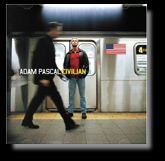 Adam Pascal has released a surprisingly listenable and captivating
follow-up to his harder-edged debut album, Model Prisoner. Entitled
Civilian, Pascal's new CD was inspired by his children and by the
effects 9/11 had on his family and on the world. Written primarily by
Pascal (with a little help on some tracks from Glenn Sherman, Matt
Gallagher and Jim Abbott), the songs are by turns driving, engaging,
thoughtful and insightful - qualities that greatly surprised this
rock-phobic reviewer. Vocally, Pascal sounds better than ever, with enough
of his trademark hoarse raspiness to enhance the emotions contained within
the song (but not so much as to affect pitch or delivery). Highlights
include the highly radio-friendly "Something of Ours" and the tender (in
a rock sort of a way) "I'm With You." Adam Pascal has released a surprisingly listenable and captivating
follow-up to his harder-edged debut album, Model Prisoner. Entitled
Civilian, Pascal's new CD was inspired by his children and by the
effects 9/11 had on his family and on the world. Written primarily by
Pascal (with a little help on some tracks from Glenn Sherman, Matt
Gallagher and Jim Abbott), the songs are by turns driving, engaging,
thoughtful and insightful - qualities that greatly surprised this
rock-phobic reviewer. Vocally, Pascal sounds better than ever, with enough
of his trademark hoarse raspiness to enhance the emotions contained within
the song (but not so much as to affect pitch or delivery). Highlights
include the highly radio-friendly "Something of Ours" and the tender (in
a rock sort of a way) "I'm With You."
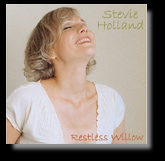 This year's Back Stage Bistro Award winner for Outstanding Vocalist of
the Year, Stevie Holland, has released a delightful jazzy album entitled
Restless Willow (the title is inspired by its opening
number, "It Might As Well Be Spring," which Holland delivers with
restrained joy). While the majority of the album consists of jazz
standards, such as "Summertime" (given an ever increasingly exuberant
guitar-driven arrangement by Gary William Friedman), "Lush Life" and
a version of "Here's That Rainy Day" that tosses in a touch of Jobim (plus a
sprinkling of "Soon It's Gonna Rain" for good measure), the real
highlights are the lesser known numbers: a very Brel sounding "Love Is
Stronger Far Than We" (by Francis Lai and Pierre Barough, with English
lyrics by Jerry Keller) and David Frishberg's "Zoot Walks In." Throughout,
Holland displays a sure but light touch and an emotional honesty that is
enthralling. This year's Back Stage Bistro Award winner for Outstanding Vocalist of
the Year, Stevie Holland, has released a delightful jazzy album entitled
Restless Willow (the title is inspired by its opening
number, "It Might As Well Be Spring," which Holland delivers with
restrained joy). While the majority of the album consists of jazz
standards, such as "Summertime" (given an ever increasingly exuberant
guitar-driven arrangement by Gary William Friedman), "Lush Life" and
a version of "Here's That Rainy Day" that tosses in a touch of Jobim (plus a
sprinkling of "Soon It's Gonna Rain" for good measure), the real
highlights are the lesser known numbers: a very Brel sounding "Love Is
Stronger Far Than We" (by Francis Lai and Pierre Barough, with English
lyrics by Jerry Keller) and David Frishberg's "Zoot Walks In." Throughout,
Holland displays a sure but light touch and an emotional honesty that is
enthralling.
 In the opening line of her first album to be released in almost a
decade, Melissa Manchester states "I've been walking through the smoke of
a thousand burned-out dreams/so hard to shake the ashes of the past from
my feet." Not a bad summation of the last decade socially and musically,
as intelligent, under-produced and low-volume music has all but vanished
from the airwaves. After 1995's disappointing (and
over-produced) If My Heart Had Wings, Manchester returns to her
storytelling roots with When I Look Down That Road, a collection
of a dozen tunes that shine with a restrained brilliance and which can
proudly stand alongside her early work. While her voice has lost the brash
belt that earned her such acclaim with hits like "Don't Cry Out Loud,"
Manchester sounds revitalized with a smoky, bluesy quality that works
exceptionally well when set against the honest emotion of numbers like "A
Mother's Prayer" and "Bend" (written with Wendy Lands), managing
to be both heartrending and hopeful. Other highlights include
"Lucky Break," a playful number written with Beth Nielsen Chapman, and
"Angels Dancing," a catchy tune that brings to life a mystical character
named Pearl. In the opening line of her first album to be released in almost a
decade, Melissa Manchester states "I've been walking through the smoke of
a thousand burned-out dreams/so hard to shake the ashes of the past from
my feet." Not a bad summation of the last decade socially and musically,
as intelligent, under-produced and low-volume music has all but vanished
from the airwaves. After 1995's disappointing (and
over-produced) If My Heart Had Wings, Manchester returns to her
storytelling roots with When I Look Down That Road, a collection
of a dozen tunes that shine with a restrained brilliance and which can
proudly stand alongside her early work. While her voice has lost the brash
belt that earned her such acclaim with hits like "Don't Cry Out Loud,"
Manchester sounds revitalized with a smoky, bluesy quality that works
exceptionally well when set against the honest emotion of numbers like "A
Mother's Prayer" and "Bend" (written with Wendy Lands), managing
to be both heartrending and hopeful. Other highlights include
"Lucky Break," a playful number written with Beth Nielsen Chapman, and
"Angels Dancing," a catchy tune that brings to life a mystical character
named Pearl.
 The Oregon-based (but internationally renowned) group Pink Martini has
at long last released its second album. Hang on Little
Tomato
(the title inspired by an advertisement for Hunt's Ketchup found in a
1964 issue of Life magazine) is a follow-up to their
highly successful 1997 debut album, Sympathique (the title song of
which was recently recorded by Karen Akers). Describing themselves as
falling "somewhere between a 1930s Cuban dance orchestra, a classical
chamber music ensemble, a Brazilian marching street band and Japanese film
noir," the 12-piece mini-orchestra fuses Latin music, jazz, cinematic
scoring, and a host of other influences to create a melange of songs that
are highly original in nature (most of which are written by members of
the group or its extended family). When they do 'cover' pre-existing
material, they do a remarkable job of choosing material and collaborators
that are not familiar to the world at large. For instance, its first truly
Asian-influenced number, a reworking of the Japanese song "Kikuchiyo to
Mohshimasu," utilized Hiroshi Wada, the slide guitarist who recorded the
song 40 years ago. And "Una Notte a Napoli," a number that would not be
out of place in a Fellini film, was written with Alba Clemente, a 1970s
Italian stage and television star, and DJ Johnny Dynell from the legendary
New York-based nightclub Jackie 60. The Oregon-based (but internationally renowned) group Pink Martini has
at long last released its second album. Hang on Little
Tomato
(the title inspired by an advertisement for Hunt's Ketchup found in a
1964 issue of Life magazine) is a follow-up to their
highly successful 1997 debut album, Sympathique (the title song of
which was recently recorded by Karen Akers). Describing themselves as
falling "somewhere between a 1930s Cuban dance orchestra, a classical
chamber music ensemble, a Brazilian marching street band and Japanese film
noir," the 12-piece mini-orchestra fuses Latin music, jazz, cinematic
scoring, and a host of other influences to create a melange of songs that
are highly original in nature (most of which are written by members of
the group or its extended family). When they do 'cover' pre-existing
material, they do a remarkable job of choosing material and collaborators
that are not familiar to the world at large. For instance, its first truly
Asian-influenced number, a reworking of the Japanese song "Kikuchiyo to
Mohshimasu," utilized Hiroshi Wada, the slide guitarist who recorded the
song 40 years ago. And "Una Notte a Napoli," a number that would not be
out of place in a Fellini film, was written with Alba Clemente, a 1970s
Italian stage and television star, and DJ Johnny Dynell from the legendary
New York-based nightclub Jackie 60.
Hang On Little Tomato is less
kitschy and not as instrumentally layered as Sympathique, choosing
instead to be more streamlined and subtle (if such a word is appropriate
when talking about a group who performs numbers like "The Gardens Of
Sampson & Beasley," a song that would have been perfectly at home in a
Doris Day flick, or one whose title tune is a big band clarinet solo and
'lady who sings with the band' driven number). The album was well worth
the wait and the group is well worth seeing if you are lucky enough to be
on their tour route. For more information and samples, visit
www.pinkmartini.com.
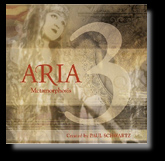 Paul Schwartz, who has conducted concerts at Lincoln Center (including
a 100th Anniversary Tribute to his father, Arthur Schwartz, who with
Howard Dietz contributed greatly to the American Songbook), as well as
acted as conductor or musical director for Lloyd Webber's Phantom of the Opera,
Song and Dance and Rodgers and Hart's On Your
Toes, has released the third album in his neo-classical Aria
series (the second of which, Aria 2: New Horizon, was the #3
Classical Album in Billboards Indie Special 2000 list). Entitled Aria
3: Metamorphosis
, the album once again features Rebecca Luker lending
her crystalline soprano to operatic arias given a decidedly
Euro/semi-trance edge by Schwartz. As with his previous albums, Schwartz
fuses contemporary instrumentation with classic operatic melodies,
layering in hypnotic vocals, waves of orchestral sound and driving (but
relatively unobtrusive) grooves that combine for emotional and sensual
effect. This time around, the songs focus primarily on pre-1750
compositions with three by Handel ("Onbra Mai Fu" from Serse,
"Lascia" from Rinaldo and "Furioso" from "Sarabande," the last of
which is rendered as an instrumental mix for a bonus track) and one from
Monteverdi ("Ascension" from L'Incoronazione Di Popea). Luker's
vocals and Schwartz's arrangements give the album a floating other-worldly
character that is by turns soothing and enthralling, and three instrumental
pieces by Schwartz based on various chapters of Ovid's
Metamorphosis add greatly to the beauty of the work. Paul Schwartz, who has conducted concerts at Lincoln Center (including
a 100th Anniversary Tribute to his father, Arthur Schwartz, who with
Howard Dietz contributed greatly to the American Songbook), as well as
acted as conductor or musical director for Lloyd Webber's Phantom of the Opera,
Song and Dance and Rodgers and Hart's On Your
Toes, has released the third album in his neo-classical Aria
series (the second of which, Aria 2: New Horizon, was the #3
Classical Album in Billboards Indie Special 2000 list). Entitled Aria
3: Metamorphosis
, the album once again features Rebecca Luker lending
her crystalline soprano to operatic arias given a decidedly
Euro/semi-trance edge by Schwartz. As with his previous albums, Schwartz
fuses contemporary instrumentation with classic operatic melodies,
layering in hypnotic vocals, waves of orchestral sound and driving (but
relatively unobtrusive) grooves that combine for emotional and sensual
effect. This time around, the songs focus primarily on pre-1750
compositions with three by Handel ("Onbra Mai Fu" from Serse,
"Lascia" from Rinaldo and "Furioso" from "Sarabande," the last of
which is rendered as an instrumental mix for a bonus track) and one from
Monteverdi ("Ascension" from L'Incoronazione Di Popea). Luker's
vocals and Schwartz's arrangements give the album a floating other-worldly
character that is by turns soothing and enthralling, and three instrumental
pieces by Schwartz based on various chapters of Ovid's
Metamorphosis add greatly to the beauty of the work.
-- Jonathan Frank
Make sure to check our list of Upcoming Releases.
|
|

